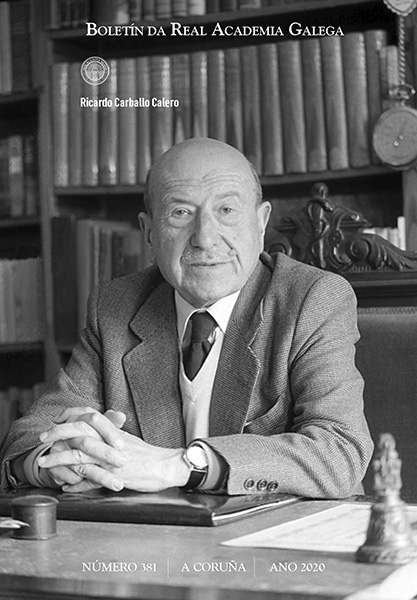The Biblical and Classical Tradition in the Poetry of Carvalho Calero (With Commentary on Five Poems)
Downloads
Published
How to Cite
Issue
Section
DOI:
https://doi.org/10.32766/brag.381.799Keywords:
Ricardo Carvalho Calero, poetry, mythology, classical tradition, Catullus, AchillesAbstract
This study analyses the importance of Greco-Roman myths (and also biblical myths) in Carvalho Calero’s poetry. For Carvalho, myth is not merely an aesthetic ornament or a cultural display, but a means of reflection in order to achieve a philosophical and existentialist poetry with a strong Christian background. Some poems from Salterio de Fingoy [Fingoy’s Psalter] feature the figures of Orpheus, Dionysus, John the Baptist and Salome. The poem ‘Abisag’, published in 1931 is analysed as one of the first examples of Rilke’s poem of the same name in Iberian literatures. It also examines Carvalho’s poem about Catullus, ‘Onde eu escrevo Lésbia, lé ti Clódia’ [‘Where I write Lesbia, you should read Clodia’], with its metaliterary reflections on the lyrical voice and the figure (and reality) of the beloved: a very interesting example of the reception of classical tradition in modern poetry. The final poems analysed are the two works about the figures of Phoenix and Achilles, a subject which come from the Ninth Book of Homer’s Iliad. Achilles’ situation in that book has interesting similarities with Carvalho’s situation with regards to his former intellectual colleagues in the Galaxia Group. The study concluded by assessing Carvalho’s contribution as the most interesting and complex example of intertextual play with the classical tradition in modern Galician poetry.
Downloads
References
Baldomir Cabanas, X. X. (2007). A poesía de Ricardo Carvalho Calero en Futuro Condicional (1961-1980). Boletín Galego de Literatura, 36-37, 7-36. Dispoñible en http://hdl.handle.net/10347/2126
Carvalho Calero, R. (1992). Fillo de Eva. (88 poemas de Ricardo Carvalho Calero). Ferrol: Sociedade de Cultura Valle Inclán. Edición de P. Pallarés.
Genette, G. (1982). Palimpsestos. La literatura en segundo grado. Madrid: Taurus.
Herrero Figueroa, A. (1981). A procura da transcendencia en Salterio de Fingoy. Grial, 74, 480-489.
Lasso de la Vega, J. (1989). La presencia del mito griego en nuestro tiempo. Gerión, 2 (núm. extra), 99-114.
Lillo Redonet, F. (1996). Algúns usos da mitoloxía clásica na poesía galega de Pondal, Cunqueiro e Carballo Calero. Galicia dende Salamanca, 1, 67-87.
Lillo Redonet, F. (1997). La temática homérica en la poesía gallega. Cuadernos de Filología Clásica. Estudios griegos e indoeuropeos, 7, 263-286.
Lillo Redonet, F. (1998). Presencia de Catulo y Tibulo en la poesía gallega del siglo XX. Cuadernos de Filología Clásica. Estudios Latinos, 14, 285-299.
Losada, J. M. (2016). Los mundos del mito. En: J. M. Losada, ed. Mitos de hoy. Ensayos de mitocrítica cultural. Berlin: Logos-Verlag, 109-185.
Pallarés, P. (2002). Carvalho Calero. Mitos para un exílio. En: T. López e F. Salinas, eds. Actas do Simposio Ricardo Carvalho Calero. “Memoria do século”. A Coruña: Universidade da Coruña / Asociación Socio-Pedagóxica Galega, 183-202.
Rodríguez Fer, C. (1989). Poesía galega. Crítica e metodoloxía. Vigo: Edicións Xerais de Galicia.
Vélez Latorre, X. M. (2015). A tradición clásica en Lanza de soledá (1961) de Aquilino Iglesia Alvariño: dun existencialismo agnóstico a unha relixiosidade mistérica. A Trabe de Ouro, 104, 61-73.
Vélez Latorre, X. M., (2019). Redescubrir Pondal para o século XXI: tradición clásica e creación poética n’Os Eoas. A Trabe de Ouro, 112, 69-82.








